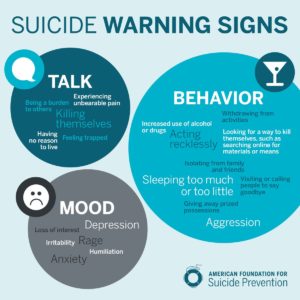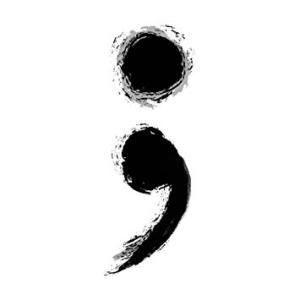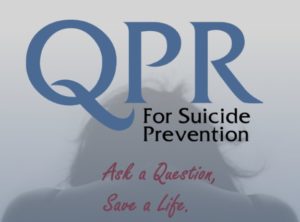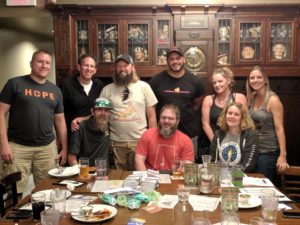![]() by Mark E. Lasbury for Indiana On Tap
by Mark E. Lasbury for Indiana On Tap
Drinking, socializing around beer, and even making craft beer don’t rate much in the hierarchy of life’s issues. As much as we celebrate it as an art form, as a way for people to be employed and to create, and as a way to bring people together, craft beer pales in comparison to things like life and liberty.
However, even as craft beer itself is a superfluous portion of our lives, it can have an effect on how we perceive and recognize others things in the world, some of them very important. Craft beer, as a part of our society, can bring attention to things far more crucial, and by doing so the industry is performing a vital function.
An Issue of Life and Death. On average, there are 129 suicides in America every single day (American Foundation for Suicide Prevention). That statistic that should give everyone pause. What’s worse, the conditions that lead to suicide are so numerous and variable that it is hard to predict or prevent. The mental health conditions that can predispose to suicidal ideations and may lead to suicide attempts are myriad, but the chances of an attempt are highest when coping abilities are exceeded by the stressors in a person’s life, either real or perceived.
Almost everyone has been affected by the death of someone at their own hand. It might have been a friend or a loved one, or the friend of a friend. Or maybe it wasn’t a suicide, but the thought of doing it by someone in your life. In general, people don’t know how to recognize the symptoms or risks or how to approach someone they think may be having a problem coping.

So how can craft beer help with this major health problem in America? By bringing attention to the issue by getting us to talk about it. And how to do that – make a bunch of beers that people will enjoy and will spark conversation. Along the way, money can be raised for programs that work in suicide prevention and people in the brewing industry can become better at recognizing the warning signs in themselves and others.
What provides optimism is that this isn’t a hypothetical situation. David Michael, the head brewer at Ruhe152 in Nappanee, has organized Hoosier Buddy, a craft beer project involving more than a dozen Indiana breweries and beer ingredient providers, a volunteer training force, and the craft beer fans of Indiana. David told me, “Initially this was just going to be a beer to honor a friend I lost a few weeks ago. After a few days, I wanted to do more. So I reached out to brewer friends on Facebook, and several jumped on immediately and enthusiastically. The guys really helped me build it into what it has become.”
He continued, “Chase was a friend from high school. I wasn’t close with him as an adult, but I have fond memories of him. I went to his memorial service and talked with several people that were close with him. He impacted a lot of lives.” Losing a friend to suicide made this a very personal issue for David, but he had been aware of the plight of people experiencing mental health challenges in his previous professional life.
He said, “I have a work history in the mental health field, I left to pursue brewing, so this give me the opportunity to use some of my training and resources to fight this growing problem.” David has a degree in psychology worked for a while with at risk teenage boys in a hospital setting. “Suicidal ideation was one of the main reasons for being admitted.” He was doing graduate work in marriage and family counseling just before he entered brewing.

David knows what an effect this problem has on many lives, not just those of the individual or the family, so he developed the Hoosier Buddy Project with fellow brewers and breweries to help bring attention to the issue, raise a bit of money for counseling and prevention, and to present an opportunity to have some training in breweries to recognize at risk behaviors and warning signs so that help can be given.
The Breweries and Beers. Nearly a dozen breweries brewed beers on the same day as a sign of camaraderie and dedication to the single goal of increasing public discussion and thought about this serious problem. Groups from the north, central, and southern parts of the state use Indiana ingredients to create products meant to stimulate discussion and to look after their friends and colleagues.
The creative art is still at play in this project, as each brewery or collaboration is making a different beer with a name to provoke interaction amongst people. David at Ruhe 152 is making a blonde ale while Jarrod May at The Tap Brewery in Bloomington is making an American Wild Ale. Sean Manahan at Kopacetic Beer Factory in Monticello is making a rye IPA and the Fortlandia Brewing guys in Fort Wayne are making a NE IPA.
Fortlandia is calling their beer Out of the Darkness, just another way to draw attention to what they want people to think about, as is the Rye IPA from Crasian Brewing from Michele and Tom Bulington in Brookston. They call their Rickshaw Ryed, calling to mind all the bumps we have to deal with along the way and how it is others that help us on our journey. Joshua Metcalf at Auburn Brewing is making a white stout called Sparkplug, a symbol representing, “the component that gives your gas engine the jolt it needs to keep going. The world need to get rid of stigma and treat everyone with respect. Give others the spark they need to get help and enjoy life as we all deserve.”
Some beers don’t have names yet, like the 2Toms Brewing offering from Fort Wayne, and the amber lager from Jesse Sensenig at Goshen Brewing, which will be out a couple of weeks later because it will be going through extended lagering. But other are set to go, like the American Wild Ale from Broad Ripple Brewpub and Jonathon Mullens called With A Little Help. Jonathon said, “This will become a different beer every year but keep the same name.” This will ensure that the topic stays in the public discussion.

Perhaps the most symbolic beer will come from the collaboration between Grand Junction Brewing and Beppe Cuello/Jared Hamilton at Greenfield’s Wooden Bear Brewing. One, a collaboration tells us how important it is to work and talk with other people. Two, the name of the harvest ale is simply “;” just a semi-colon, the symbol that represents the idea that a sentence or thought is unfinished and is used for suicide prevention/depression awareness. It means something comes next – there’s something else going on – don’t let something end. Getting people to talk about that something else, or helping people to realize that there’s always something else, a next thought or act, no matter how dark something seems now. Either help someone see that next part and they have unfinished business, or to help people think about what they see in others. Is there something else going on here?
But it isn’t just the breweries that have gotten involved with Hoosier Buddy. Ryan Thomas, head brewer at Grand Junction said, “Everyone wanted it to be a local product, so it was important that the yeast, hops, and malt providers got involved. All got breaks on ingredients or they were donated.” Caleb Michalke at Sugar Creek Malts donated and discounted all kinds of malts for the brewers. Ryan Hammer and the guys at Crazy Horse Hops in Knightstown as well as KC and Ryan at Indy High Bines provided hops, and Matt Bochman at IU and Wild Pitch Yeast sent out cultures to use. Clearly, everyone in the industry understands the importance of this project.
All the beers but one should be ready for tapping in a week or so; look for some coordinated releases and perhaps some tap takeovers by keeping an eye on the Hoosier Buddy Facebook page. Ryan stated that they are trying to coordinate a tap takeover in Bloomington and Indy at The Tap, as well as at Mayfair Taproom. Mostly the beers will be available in the taprooms, but they will also try to get some of them to featured bars and restaurants.

This program has legs, so there are already thoughts to next year. Perhaps a common label for some packaging or a name or beer theme to further bring attention to the project. However, this year’s inaugural efforts won’t end when the beers are gone. The breweries will continue to provide resources and information year round.
Personal Connections. The participants aren’t making beers to help people gloss over or medicate problems, Ryan says they are made in order to help people contemplate the issue and think more deeply about it than they might otherwise. And it comes easy for this group of people; there are so many personal connections that drive home the extent of the tragedy of suicide. Almost all the participants have been personally touched by this or have worked in or around the mental health community. Or even more personally, people around breweries are just as susceptible to problems with coping and depression as anyone else.
Both David Michaels and Jesse Sensenig have worked in social work and counseling, they have seen the capacity for proper help to do wonders as well as the tragedies that occur when people don’t receive or reach out for help.
Ryan Thomas sadly attested, “Everyone has been affected, one way or another.” And this applies to breweries perhaps more than most other industries. David, Ryan, three of the five fellows at Fortlandia, and Michele and Tom Bulington of Crasian Brewing have each lost at least one friend to suicide and have seen the devastation it leaves behind. Sean Manahan of Kopacetic has been vocal about his loss of a brewing friend and the need to tell people how you feel and try to help when you can. Sam Synder of Fortlandia spoke for all them saying, “We are happy to raise awareness and make it a subject more acceptable to talk about.”

Jonathon Mullens has lost many people in his life to suicide, and knows more that have attempted it. He sees it as being unusually prevalent in brewing. What’s more, he has had to “deal with his own demons” and this project helps him fight them off. These thoughts were echoed poignantly by Ryan Thomas – tragedies in his personal life almost got the best of him. But he was lucky to have a good dog and good friends, and they saw him through.
The darkness does reappear in Ryan’s head every once in a while and was brought back to the fore at the initiation of this project, but he knows how to cope now, and felt that Hoosier Buddy would be a good way – not to heal himself or put it behind him – but to reinforce that he has a purpose here and that he can perhaps help others. As a part of this project, Ryan contacted his ex-fiancée, a crisis counselor and asked her for some people to talk to. Hoosier Buddy has to look no further than Ryan himself to see how the initiative is helping people.
Suicide Prevention and Risk Awareness Training. So the brewery is a place in which people have all the experiences, histories, and problems that everyone else has. How can they possibly help the situation? Get informed and be active. In an effort to do this, the Hoosier Buddy Project includes a training seminar called QPR from volunteers from Purdue University. The letters stand for question, persuade, and refer and help people to recognize and approach people that they believe may be having problems coping or are depressed.

The training has been provided at no cost, with two sessions already held, one in Fort Wayne and one in Indianapolis. Breweries encouraged their personnel to attend, and Ruhe152 alone brought a dozen people. The session at Broad Ripple Brewpub last week brought together folks from several different breweries, and there is another session scheduled for Bloomington. If any readers are interested in learning more about QPR training, contact Jared Morris at 765-494-1747/morri266@purdue.edu or contact the QPR Institute.
Conclusion. David said, “I’m hoping this will bring awareness by using the brewery social media platform to possibly encourage people to talk about suicide, have the uncomfortable conversation, and reach out to those that are struggling. People watch our pages, they are interested in what we have to say, why not use that soapbox for good?” Please seek out the breweries who are involved in this effort and the beers being made as a part of it. Take the time to talk to the brewery personnel, learn what they have learned in their training and hear their stories and reasons for pursuing this action.
By bringing this prevalent problem into the light, we can de-stigmatize the discussion of mental health and work in small ways to save lives. If there is one thing David wants everyone to take from this work, it’s, “You have value, you have purpose, stay alive.”
